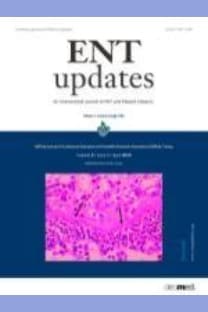Türk kulak burun boğaz hekimlerinin bilimsel toplantı tercihleri: Anket çalışması
Bilimsel toplantı, Kulak Burun Boğaz, uzman
Preferences of Turkish ENT specialists about academical meetings: a survey study
Academic meeting, ENT specialists, otorhinolaryngology,
___
- Bhargava D, Al-Saidi Y, Bhargava K, Al-Abri R. Information mas- tery, effective health care, evidence-based practice and the oto- laryngologist. Sultan Qaboos Univ Med J 2011;11:492-6
- Bowden CL, Bowden VM. A survey of information sources used by psychiatrists. Bull Med Libr Assoc 1971;59:603-8.
- Covell DG, Uman GC, Manning PR. Information needs in office practice: are they being met? Ann Intern Med 1985;103:596-9.
- Hulkonen DA, Mack BR. Physicians’ perceptions of library serv- ices in a rural state. Bull Med Libr Assoc 1986;74:205-9.
- Renford BL, Eagleson BK. Profiling family physicians and their use of information sources. Med Rev Serv Q 1982;1:39-52.
- Salasin J, Cedar T. Information-seeking behavior in an applied research/service delivery setting. J Am Soc Inf Sci 1985;36:94-103.
- Siegel ER. Transfer of information to health practitioners. Prog Commun Sci 1982;3:311-34
- Strasser TC. The information needs of practicing physicians in northeastern New York state. Bull Med Libr Assoc 1978;66:200-9.
- Weınberg AD, Ulllan L, Richards WD, Cooper P. Informal advice- and information-seeking between physicians. J Med Educ 1981;56:174-80.
- Dee C, Blazek R. Information needs of the rural physician: a descriptive study. Bull Med Libr Assoc 1993;81:259-64.
- Schweinfurth JM. Interactive instruction in otolaryngology resi- dent education. Otolaryngol Clin North Am 2007;40:1203-14, vi.
- Kandasamy T, Fung K. Interactive Internet-based cases for undergraduate otolaryngology education. Otolaryngol Head Neck Surg 2009;140:398-402.
- Fuchs M, Strauss G, Werner T, Bootz F. Teleteaching in otorhi- nolaryngology. Part 2: the European database “medicstream”. [Article in German] HNO 2003;51:104-12.
- Shin JJ, Rauch SD, Wasserman J, Coblens O, Randolph GW. Evidence-based medicine in otolaryngology, part 2: the current state of affairs. Otolaryngol Head Neck Surg 2011;144:331-7.
- Fuchs M, Strauss G, Werner T, Bootz F. Teleteaching in otorhi- nolaryngology (part 1). Real-time transmission of a congress in picture and tone into the Internet. [Article in German] HNO 2003;51:16-24.
- Gönül ‹I, Altınok G, Alper M, et al. E¤itici gözüyle patoloji uzmanlık e¤itimi: Anket sonuçları. Türk Patoloji Dergisi 2008;24: 27-32.
- This is an open access article distributed under the terms of the Creative Commons Attribution-NonCommercial-NoDerivs 3.0 Unported (CC BY
- NC-ND0) Licence (http://creativecommons.org/licenses/by-nc-nd/3.0/) which permits unrestricted noncommercial use, distribution, and reproduc
- tion in any medium, provided the original work is properly cited.
- Please cite this article as: Cingi CC, O¤han F, Abakay MA, Ulusoy S. Preferences of Turkish ENT specialists about academical meetings: a survey study.
- J Med Updates 2013;3(2):62-68.
- ISSN: 2149-7109
- Başlangıç: 2015
- Yayıncı: Prof.Dr.Murat Demir
İzoretinoin kullanan hastalarda işitme kaybı: Bir yan etki mi yoksa nedeni hiperlipidemi mi?
O. Fatih Boztepe, Sevil Alan, Taylan Gün, K. Murat Özcan, Ö. Erdem Gür
Total larenjektomili hastada iç kanül aspirasyonu: Olgu sunumu
Zafer Hırçın, Görkem Eskiizmir
Soner Taşar, Melek Kezban Gürbüz, Ercan Kaya, Erkan Özüdoğru, Fatma Güney, Hamdi Çaklı, Armağan İncesulu
Türk kulak burun boğaz hekimlerinin bilimsel toplantı tercihleri: Anket çalışması
Can Cemal Cingi, Fatih Oğhan, Mehmet Akif Abakay, Seçkin Ulusoy
Oğuz Güçlü, İbrahim Yazıcı, Tolgahan Toroslu, Fevzi Sefa Dereköy
Yenidoğan indirekt hiperbilirubinemili hastalarda işitmenin değerlendirilmesi
Baki Korkmaz, İmran Şan, Murat Kar, İsmail İynen
Önemli bir toplumsal sorun: Alerjik rinit
İbrahim Sayın, Cemal Cingi, Turhan San, Seçkin Ulusoy, Mustafa Acar
Mediastinal tüberküloz lenfadenopatisine bağlı sol vokal kord paralizisi
Oğuzhan Dikici, Nuray Bayar Muluk
Murat Gümüşsoy, İlker Burak Arslan, İbrahim Çukurova
Birsen Yücel, Ayfer Ay Eren, Eda Erdiş, Nalan Akgül Babacan, Emine Elif Altuntaş
